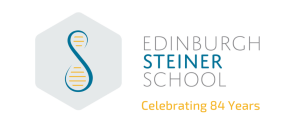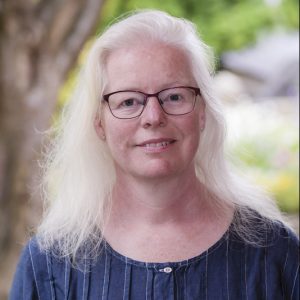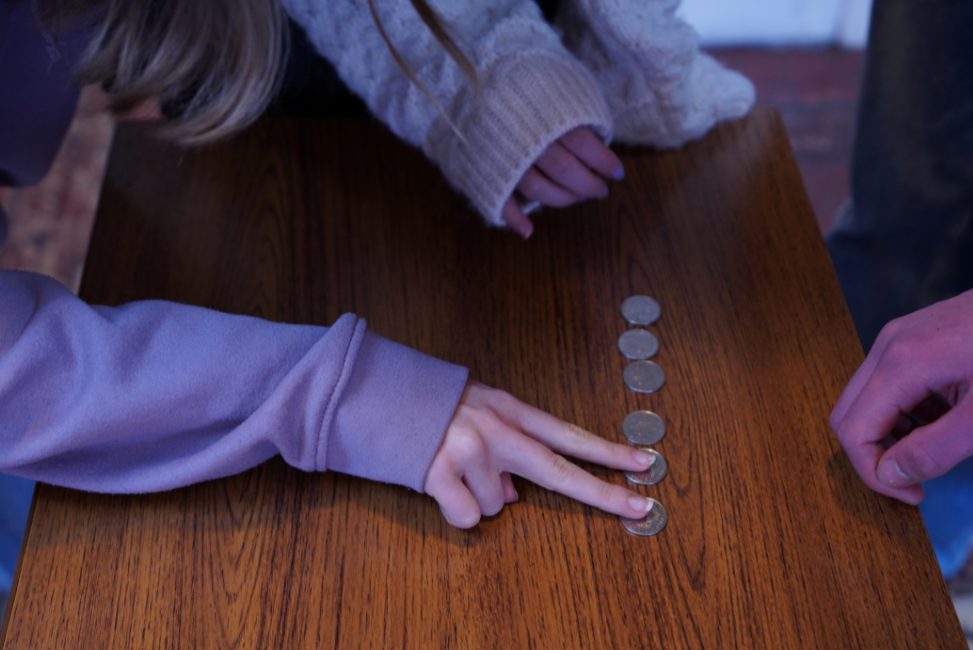First Cohort Include Integrative Education Certificate On UCAS Applications
December 12 2023
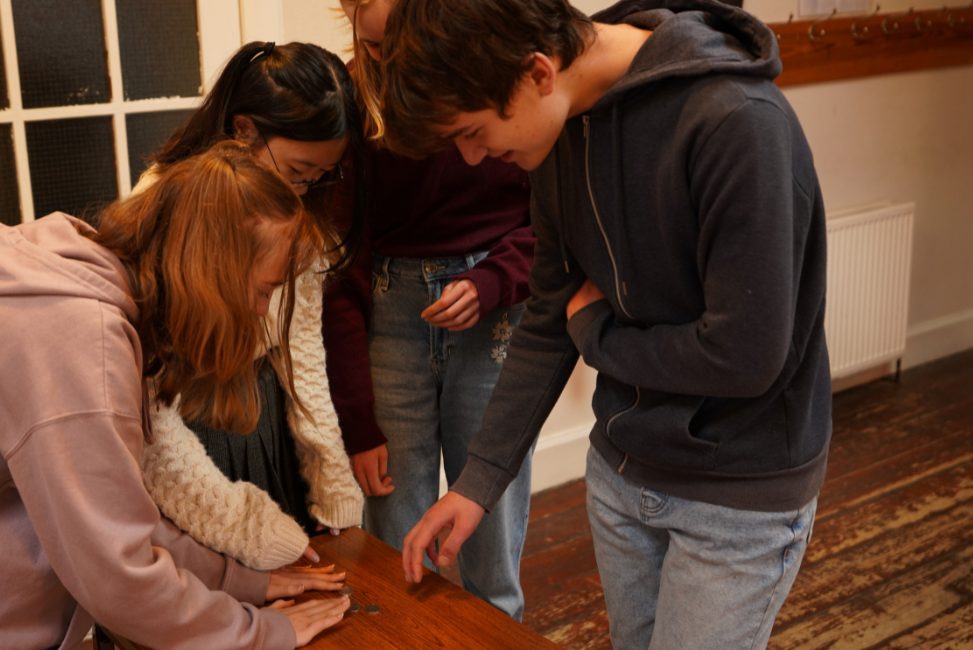
Heuristic thinking, excercised in this coin puzzle, is one of eleven creative thinking skills developed through the innovative Integrative Education Certificate. The first cohort of pupils include the portfolio-based (non exam) qualification on their UCAS applications this term.
The Careers Department and Integrative Education Teachers mark a milestone moment for the innovative portfolio-based qualifications offered at Edinburgh Steiner School, as this year’s university applicants include the Integrative Education Certificate on their applications through the Universities and Colleges Admissions Service.
There are seven Integrative Education qualifications, derived out of the international 3-year ACTS project (2015 – 2017), which brought together over 50 Waldorf educators from four countries, funded by an Erasmus+ grant.
| Level 2 (14-16 years) GCSE/Scottish National 5 equivalent• IE Award • IE Certificate • IE Diploma • IE Extended Diploma |
Level 3 (16-18 years) A-level/Scottish Higher equivalent• IE Certificate • IE Diploma • IE Extended Diploma |
The Integrative Education (IE) qualifications, including the Level 2 IE Award and IE Certificate offered at ESS, joined the Ofqual register – demonstrating they have equivalent value to other qualifications of the same Level, and launched in December 2018. Since then, they have been taught successfully in schools and settings across the UK.
The Class 8 project – the backbone of the IE Award, equivalent to one Nat 5 – has a well-established place in our curriculum that spans almost three decades; albeit undertaken a whole year earlier than the qualification age specification. Beginning in 2019, the pilot group of then 13-year-olds embarked on the Independent Project. In ordinary times they would put up an exhibition of their projects for the school community to view the fruits of their labour, but weeks before the scheduled event, Scotland went into lockdown, closing schools. Undeterred, the pupils learnt how to build a web page from scratch to showcase their work virtually.
A year on, against a backdrop of what would have been prelim season for tens of thousands of pupils across Scotland, the second cohort of IE pupils exhibited their projects in the school hall, used ordinarily to sit SQA exams. An online exhibition opened it up to the wider body of parents, who remained off campus. Pupils who had completed the first module of the IE Certificate (namely the Independent Project) moved on to the Creative Thinking Skills module in the Upper School.
In 2021, ten ESS teenagers were the first in Scotland to receive their Integrated Education Certificates. Graded at Pass, Merit and Distinction, half of the graduates of the IE Certificate achieved the highest grade. Ofqual-regulated awarding body, Crossfields Institute, also presented 14 pupils with the IE Award.
Since then, a further 39 learners have received their IE Level 2 Award and 23 learners have acheived their IE Level 2 Certificate over 2022 – 2023 at ESS.

Above photograph: Eve Hodgson, one of the first pupils to receive an innovative, interdisciplinary qualification, equivalent to two Nat 5s, that has no exam in 2021. Passing with a Distinction, Eve chose to explore paper for her Independent Project in Class 8. She then completed the Creative Thinking Skills Module in the Upper School. Eve and fellow classmates graduate from Class 12 in July.
In the recent Parents Evening on the Upper School Curriculum, Ms Macdonald-Russell shared an insight into the comprehensive careers application services offered at ESS, which include resources allocated to facilitate multiple redrafts of a pupil’s Personal Statement. This week saw several pupils receive early offers – one arriving less than 24 hours after the application was sent, which speaks to the quality of UCAS applications that our pupils make.
CFI Level 2 IEC was noted as a concrete part of ESS pupils’ recorded education history on their UCAS applications this year – further important incremental progress towards IE being accepted and recognised as a valid qualification, equivalent to National Courses or GCSEs.
- Education Manager, Alistair Pugh
The UN Agenda for Transforming our world: the 2030 Agenda for Sustainable Development was agreed in 2015. It was a plan of action for people, planet and prosperity, with seventeen identified goals to address the most pressing global problems facing both the current and future generations. It informs educational policies.
Within this document, the words ‘innovation’ and ‘innovative’ appear twenty-six times, particularly in relation to the needs of science, technology, infrastructure and economic growth. But, curiously, these words do not appear anywhere in Goal 4: education provision or aims.
Sir Ken Robinson’s TED Talk on Creativity has now been viewed more than 22 million times on YouTube, where he states creativity is as important as literacy. The IE suite of qualifications derived from the international Acknowledging Creative Thinking Skills (ACTS) project – which had Nobel Laureate in Neuroscience (and Waldorf graduate), Thomas Sudhof as ACTS Patron – aims to equip pupils with a range of relevant skills which supports them to access higher education, employment and entrepreneurship.
Alistair Pugh (above, left) and Hester Machin (above right) have completed the postgraduate degree in Integrated Education. In a published article on the suite of qualifications, titled: ‘Playful participation in curriculum design’ in Play and health in Childhood, Mr Pugh writes:
While play is now widely accepted as the ‘work of childhood’, there is still an expectation among many parents (and not a few teachers) that older children and young people will – at some nebulous intellectual tipping point – finally get down to some ‘real serious work’, work which is at its most serious when it involves sitting in front of a whiteboard with a textbook in one hand and a biro in the other.”
He wraps the chapter with the statement that young people can’t learn if they’re not involved. “And if they’re going to get involved”, he adds, “they must come out to play.”
The IE Certificate now contains three modules: An Independent Project, Personal and Social Learning Skills and Creative Thinking Skills, equating to 36 credits (1 credit per 10 hours of learning time). The awarding body has changed to Kato Education (formerly Crossfields Institute or CFI).
In the latter Module, there are 11 creative thinking skills that have been developed by Elaine Holt and articulated through the Erasmus+ funded ACTS project that pupils are credited on:
- 1. Written Linguistic Articulation – the ability to formulate coherent written communication for various contexts using appropriate vocabulary.
- 2. Verbal Linguistic Articulation – the ability to formulate coherent spoken communication in various contexts using appropriate vocabulary and expression.
- 3. Imaginative, Non-Linguistic Thought Pictures in 2 dimensions – the ability to generate 2-dimensional pictorial images that can then be communicated, for example as images or linguistic descriptions
- 4. Imagined Inner Structure/systems in three dimensions and over time – the ability to mentally maintain an overview of three-dimensional physical or conceptual mechanisms, systems, forms or processes of change. It is also the ability to co-ordinate a variety of perspectives including the ability to represent the point of view or experience of another person.
- 5. Resonance and Pattern in Thinking – the ability to represent and place memories, experiences and associations into meaningful relationships. This could be conceptual, visual, expressed in movement, music, mathematical terms or in other ways.
- 6. Observational Thinking: the commonplace in novel terms – the ability to produce an innovative approach or insight to common problems or accepted wisdom. It involves seeing beyond the obvious, to reach the essence, the reality or the unseen potential.
- 7. Co-ordinated Thinking – the ability to multi-task ideas, concepts, strategies and approaches, whilst keeping an eye on deadlines, personal organisation and needs, and the associated internal and external ethical considerations associated with any potential action.
- 8. Heuristic Thinking/Improvisation – the ability to use common sense when working with unknowns. The use of trial-and-error. Heuristic thinking is often an inspired attempt, and most importantly it entails being willing to fail. It may involve thinking through the practical application of the hands/body or ‘whole body thinking’.
- 9. Contemplation – the ability to refrain from judgement or prejudice when considering, for example, information or experiences and maintain that position for a sustained period to achieve a wider, more objective overview.
- 10. Critical Analysis – the ability to make reasoned and coherent judgements on the basis of an informed understanding.
- 11. Reflection on Perception – the ability to objectively compare and contrast a new perception with a previously held view, experience or understanding and support or adapt one or the other. This includes perception of one’s own thought processes. Where this presents a paradox, this can be consciously recognised and acknowledged.
In yesterday morning’s Creative Thinking Skills lesson with Mr Pugh and Mrs Machin, pupils revisited the coin puzzle, which excercises heuristic thinking (improvisation). Mr Pugh elaborates below.
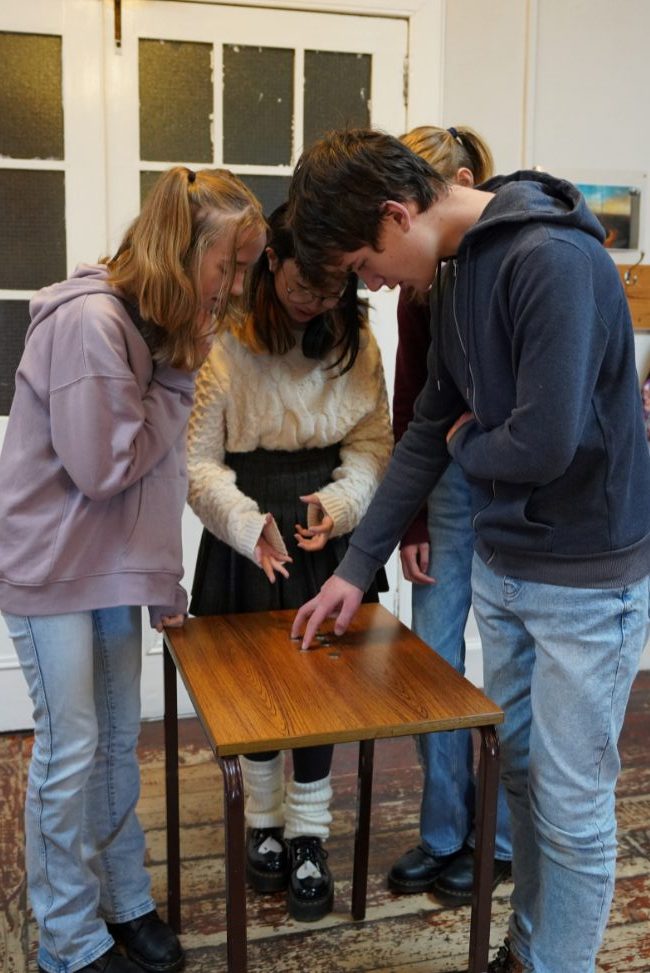
53 learners have gained the IE Award and 33 learners have achived the IE Certificate at Level 2.
“Throughout the year, Class 9 receive one timetabled lesson a week to practise creative thinking in preparation for one of the modules of Integrated Education. Activities range from imaginative writing, to drawing, modelling and debating, to playing games such as the coin puzzle (pictured) where the pupils have to figure out how to rearrange a line of coins into a specific order of heads and tails using a minimum number of moves.
“Pupils can develop any aspect of their work from these lessons to generate evidence for assessment, in addition to work from their Main Lessons – and beyond.” says Mr Pugh.
Class 9 pupils excercising heuristic thinking skills – one of the 11 creative thinking skills learnt in the IE Certificate through a coin puzzle.
Integrated Education starts from the premise that all subjects are interrelated. In this way, genuine, open questions are unconstrained by artificial ‘topics’. Project work begins with whatever the learner finds interesting, and, crucially any non-formal and informal learning undertaken outside the classroom can be credited,” Mr Pugh continues.
Upper School Geography Teacher and SQA Coordinator, Mr Pugh, has been involved in the IE qualifications since their inception in 2015. He explains:
Embedded in the DNA of the Integrated Education are eleven Creative Thinking Skills (CTS). Not every piece of work must demonstrate every CTS, so pupils have the freedom to experiment, compile evidence from multiple sources and try out different forms of presentation such as drama, sculpture or photography.
One of our CTS credits ‘heuristic thinking’ – improvisation. ‘Try it,’ goes the mantra, ‘and if it doesn’t work, don’t think of it as wrong, just try again – or try a different approach.’ This skill was crucial to solving the coin puzzle, as it has been to the work of scientists for hundreds of years. When the process of trial and error is given credit, pupils can relax, untroubled by anxieties about ‘failure.’”
Try it:
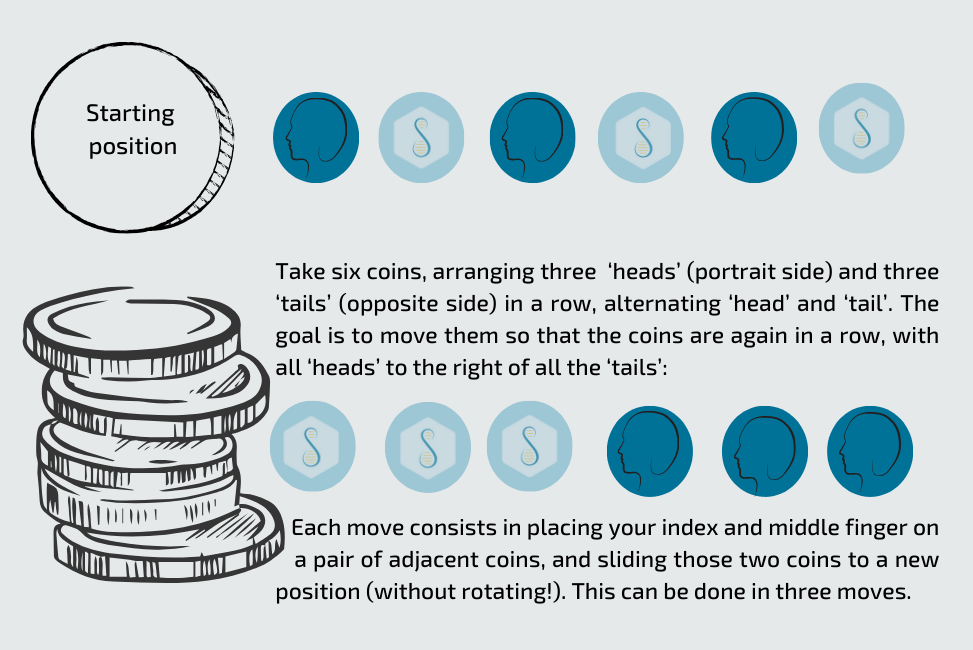
The Coins Puzzle excercises Heuristic Thinking/Improvisation – the ability to use common sense when working with unknowns. The use of trial-and-error. Heuristic thinking is often an inspired attempt, and most importantly it entails being willing to fail. It may involve thinking through the practical application of the hands/body or ‘whole body thinking’.
Read the full Tuesday Notice here: Edinburgh Steiner School’s weekly ezine
News pieces:
School calendar dates
Management Surgeries
Parent & Teacher Association Meeting Minutes
School Improvement Plan Published
Farewell To Eden Villiers
Welcoming New After School Club Assistant
No Clubs This & Next Week
Invitation: Christmas Concert Tomorrow
Friday Market – Christmas Stall
Christmas Market Expenses Deadline: Friday
Waldorf Weekend Workshop: Christmas Craft
First Oberufer Plays Next Week
Reading Group Starts Lecture 3 On Wednesday
New Interest In ESS Car Share Scheme
First Cohort Include IEC On UCAS Applications
Adverts from school community
